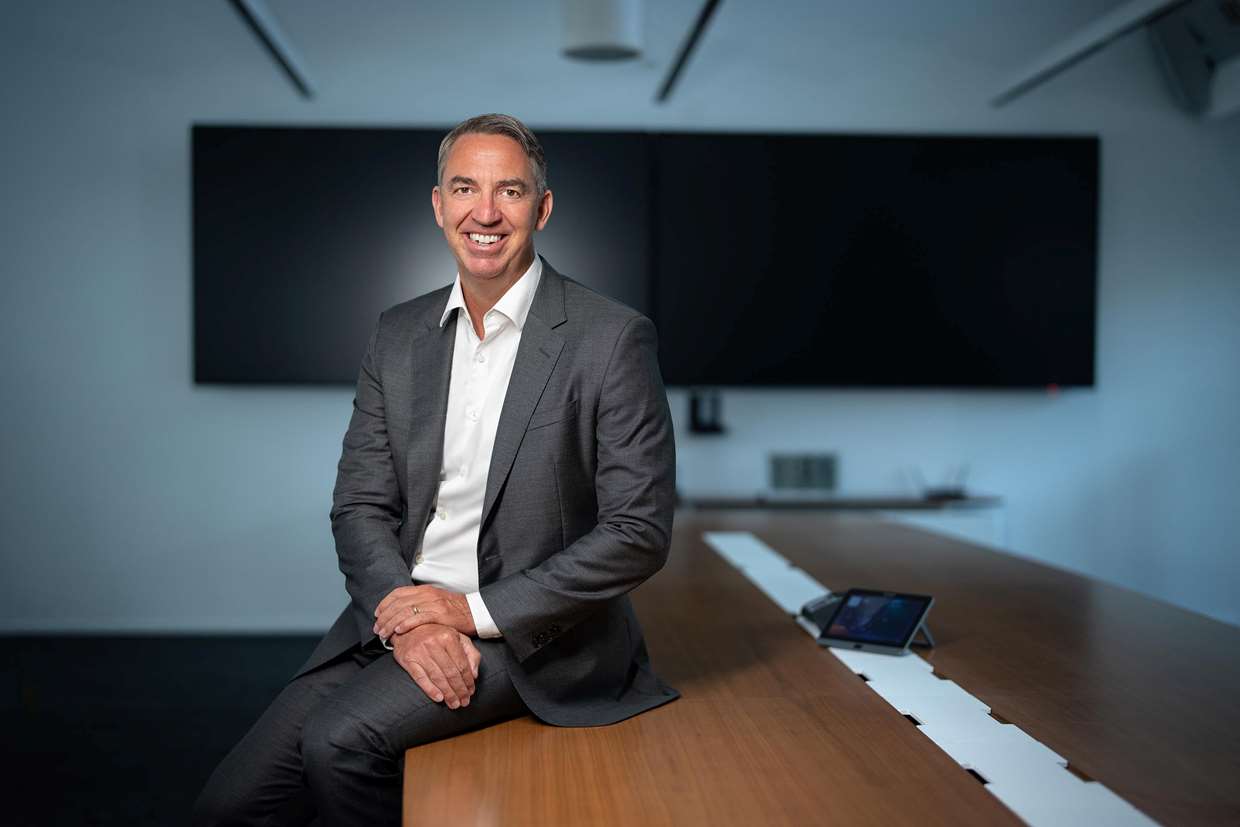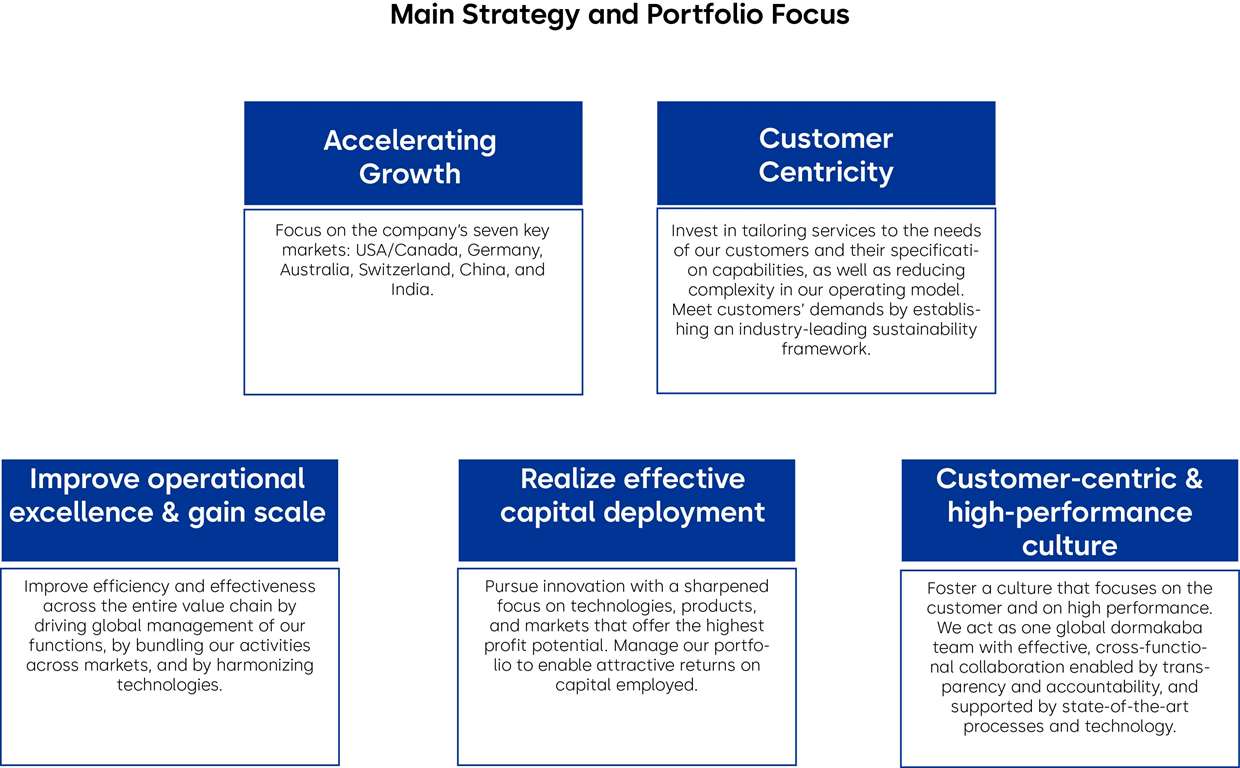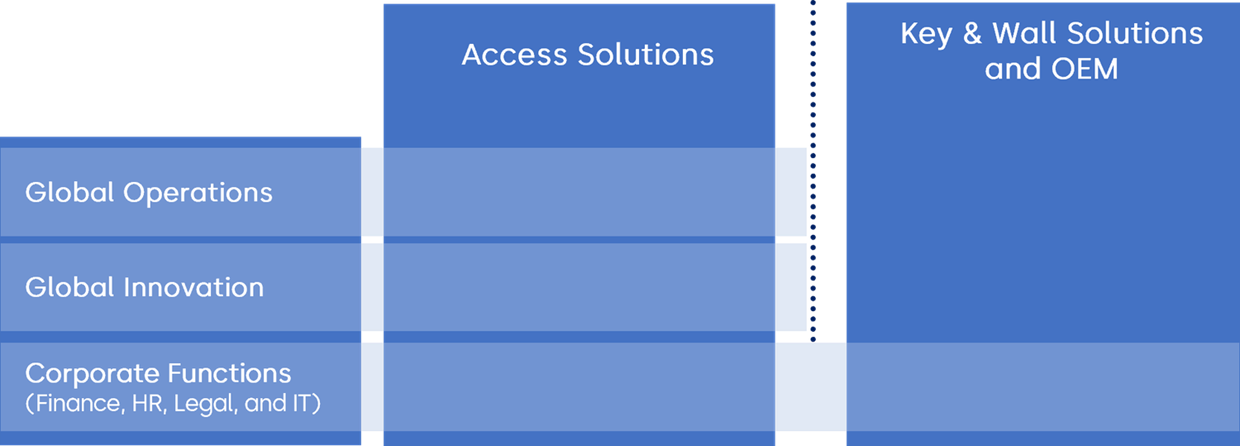Introduction
Three years after launching our sustainability framework and 30+ ESG targets, weʼre proud to share our achievements and future plans. Our goal is to offer more sustainable access solutions for every place that matters.
2023/24 in brief
- Scope 1+2 emissions were reduced by 12,500 tCO2e against our baseline in FY 19/20
- We have expanded the production of on-site solar energy by 550% within a year
- The recordable injury rate dropped by 21% against the previous year
- 322 sustainability-related product declarations and certifications are now available
- 164 high-risk suppliers were assessed through our Supplier Sustainability Engagement Program
- 28% of candidates for succession of senior management positions are women
- Commitment to invest nearly CHF 1 million in our child labor remediation project in the Democratic Republic of Congo with Save the Children Switzerland over ten years
- External acknowledgments: Gold medal from EcoVadis; World’s Most Sustainable Companies 2024 by TIME magazine; Europe’s Climate Leaders by the Financial Times; AA rating from MSCI; Prime Status in the ISS-ESG Corporate Rating.
Letter from the CEO

Dear Stakeholders,
Since becoming CEO, I have met many colleagues who support and are excited about our vision of sustainability. And this vision is backed by concrete, quantifiable initiatives on the ground that are making our aspirations a reality — we are letting our actions do the talking.
Looking back on our sustainability achievements during the past financial year, I am proud to highlight some of our key recognitions: we received a gold medal from EcoVadis, were listed as one of the World’s Most Sustainable Companies 2024 by TIME magazine, and have been lauded as one of Europe’s Climate Leaders by the Financial Times. Not only that, we also retained our Prime Status issued by the ISS-ESG Corporate Rating and our AA rating from MSCI. These are all fantastic achievements.
During FY 23/24 we continued our work to reduce our carbon emissions. A prime example of this is the installation and commissioning of three photovoltaic power plants with a total of 21,000 solar panels on the roofs of our production sites in Melaka (Malaysia), Suzhou (China), and Taishan (China). With these, we are now generating 5.5 times more solar energy on site than in the last financial year. Harnessing energy from on-site solar panels is part of our climate transition plan, whose overarching goal is to reduce our operational emissions by 42% by 2030. Since our baseline in FY 19/20, our Scope 1+2 emissions have fallen by 12,500 tCO2e.
At dormakaba, we bring together innovation, customer satisfaction, and sustainability by offering solutions that help our clients meet their own sustainability goals. One of the key tools that has been instrumental in demonstrating our commitment to these values is the dormakaba Door Efficiency Calculator (DEC). By offering a detailed analysis of the impact of our access solutions on a buildingʼs airflow, energy usage, and CO2 emissions, as well as the estimated lifetime costs, our DEC gives our customers a clear picture of the long-term benefits and savings that come from choosing our products. In FY 23/24, we rolled out the DEC in 18 countries and trained over 250 sales colleagues on how best to consult prospective customers.
We have also strengthened our focus on human rights issues both within and outside our operations. Internally, we have set up a Human Rights Risk Management System that covers and classifies all dormakaba locations into four risk categories. This system serves as a basis for prioritizing sites for additional due diligence measures, such as on-site auditing cycles, mandatory training tailored to identified risks, and one-to-one support.
As the CEO of a manufacturing company, I place great importance on the safety and well-being of all my colleagues. This is also a human right. Thanks to our proactive safety culture, we have managed to decrease our recordable injury rate by 21% compared to the previous financial year baseline (1.5 in FY 22/23). This is partly the result of our increased efforts to raise awareness regarding health and safety and partly the simple process involved in reporting unsafe situations. Each unsafe observation that is flagged by our employees is another potential injury avoided. Still, there is another element that has led to greater success in reducing workplace injuries: our Health & Safety Directive. As of FY 23/24, over 77% of our sites have completed an applicability assessment pertaining to the Health & Safety Directive, and over 65% have developed site-specific action plans to eliminate any gaps related to the Directive’s requirements.
To also respect human rights in the supply chain, we have entered into a long-term partnership with Save the Children Switzerland and the Centre for Child Rights and Business as part of a landmark project to remediate child labor victims in small-scale mining communities in the Democratic Republic of Congo (DRC). Over a period of ten years, dormakaba will invest around CHF 1 million in total to support the project’s objectives. We, like any company that sources electronic components, cannot be sure that the cobalt used to manufacture such components does not come from the DRC. We are therefore calling on other companies to join our remediation efforts to collectively address the pervasive issue of child labor in small-scale mining communities in the DRC.
We continue to harness the latest technology in our efforts related to supply chain transparency. In the past year, we introduced a robotic process automation tool named EVA to streamline and accelerate communication processes with thousands of our suppliers with regard to sustainability assessments. In addition, we began using an AI-based risk management tool to close gaps and find, understand, and categorize risks, including sustainability risks, that affect our supply chain. Such tools also enable us to remain compliant with rapidly changing laws and regulations in this field. So far, we have assessed 31.7% of suppliers in our target group.
Finally, like many other publicly listed companies, we are subject to ever-increasing demands from regulators when it comes to environmental and social management. Since 2011, more than 1,200 ESG policy interventions have been introduced worldwide, each one raising the bar as to how a just and sustainable business should act. At dormakaba, we benefit from already having a strong sustainability governance and management foundation, with clear targets and ambitions to guide us.
Even so, the rising tide of new regulations means we have more work to do. This is why we are expanding elements of our sustainability governance and efforts. For example, we have delegated more responsibility to the Board of Directors and the Executive Committee regarding oversight and decisions related to our sustainability targets and measures. Furthermore, this financial year is the first in which we are publishing our TCFD (Task Force on Climate-Related Financial Disclosures) along with our extended EU Taxonomy reports. In addition, we are now reporting according to the requirements of the Swiss Code of Obligations with regard to non-financial reporting. Whatʼs more, to ensure we are in line with the EU Corporate Sustainability Reporting Directive – which will apply to parts of our company from the next financial year – we have completed the required double materiality assessment together with top management and other relevant stakeholders.
As CEO, I encourage my colleagues worldwide to keep supporting our sustainability endeavors in the areas where they have the most impact. This will help us to achieve our global targets, which were set by putting our customers’ needs at the forefront of everything we do. As well as striving to offer them sustainable solutions, we want our customers to be confident in the fact that we manufacture our products in a socially and environmentally responsible manner. Thank you to everyone that has contributed to these goals in the last financial year – keep it up!
Yours sincerely,

Till Reuter
CEO of dormakaba
About dormakaba
Our business
The dormakaba Group (dormakaba) is a leading provider in the access solutions market. The company offers customers a broad, innovative portfolio of products, solutions, and services that easily fit into building ecosystems. With clear portfolio segmentation, dormakaba focuses on its global core businesses Access Automation Solutions (door operators, sliding doors, and revolving doors), Access Control Solutions (connected devices and engineered solutions), Access Hardware Solutions (door closers, exit devices, and mechanical key systems), and Services. The company is also a market leader for Key Systems (key blanks, key cutting machines, and automotive solutions such as transponder keys and programmers) and Movable Walls, which includes acoustic movable partitions and horizontal and vertical partitioning systems.
dormakaba has a long tradition of innovation and engineering expertise. It strives to be an innovation leader that anticipates and fulfills customer needs through continuous technological advancement, creating state-of-the-art solutions that add value for customers and end users alike.
dormakaba is active in around 130 countries and is present in all relevant markets through production sites, distribution and service offices, and collaboration with local partners.
dormakabaʼs corporate strategy – Shape4Growth (S4G) – is about transforming the company, shaping it to its full potential, and accelerating profitable growth. It does so by building on five strategic pillars: Accelerating profitable growth; Focus on customer centricity; Improve operational excellence and gain scale; Realize effective capital deployment; Customer-centric and high-performance culture. Sustainability is a key focus of our customer centricity pillar.

Click here for more information about the strategy.
Operating model
Under the Shape4Growth strategy, dormakaba’s operating model builds on globalized management of our Operations and Product Development (Innovation) functions to secure efficiencies of scale and business synergies. This setup extends to globally managed Finance and HR functions.
Since 1 July 2023, the Executive Committee has comprised the CEO, CFO, Chief Operations Officer (COO), Chief Commercial Officer (CCO), and Chief Innovation Officer (CIO), along with the President Key & Wall Solutions and OEM.
The CCO leads all Access Solutions market organizations, with those in our “5+2” key markets reporting directly and the others managed through three country clusters for increased efficiency. Customer excellence functions such as Strategic Marketing, Global Accounts & OEM, Services, and Product Management for Access Hardware Solutions and Access Automation Solutions are also under the CCO’s leadership.
Product Development, along with the combined Access Control Solutions and EntriWorX product management organization, are the responsibility of the CIO. The distinction reflects the different requirements of mature versus emerging businesses: it allows management of more mature product segments in Access Hardware Solutions and Access Automation Solutions to move closer to the market, enabling faster innovation in newer and more dynamic segments. Product Development encompasses three main competence center areas: Software, Hard/Firmware, and Mechanical Engineering. In addition to these competence centers, the Global Architecture team plays a crucial role in defining the technology standards, ensuring consistency and excellence across all products. Engineering Management oversees the planning and execution control of all development programs, ensuring that strategic objectives are met.

A detailed description of the structure can be found in the Notes to the consolidated financial statements for financial year 2023/24.
Our value chain
Our employees1
Employees by region
Employees by contract type
Employees by employment type
The key performance indicators for the above human resources data and the fluctuation figures available in the Fair Employment chapter and the ESG Performance Table are based on 100% of dormakaba Group employees as at 30 June 2024. The total workforce in this scope consisted of 15,736 employees, based on headcount. While the majority of our employees work full-time and on the basis of permanent contracts, 6% are engaged on a part-time basis. 39% of the employees in this scope are covered by collective bargaining agreements. In addition, dormakaba engaged 359 apprentices, trainees, and interns, and employed 2,025 contract workers at the sites in scope.
The collective bargaining coverage and training hours KPIs reported in the Training & Education chapter are based on the scope of employees located at the 111 sites in the reporting coverage as at 30 June 2024 (see Outro, 95% of dormakaba employees).